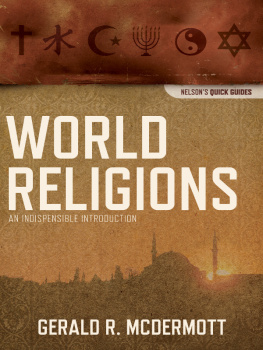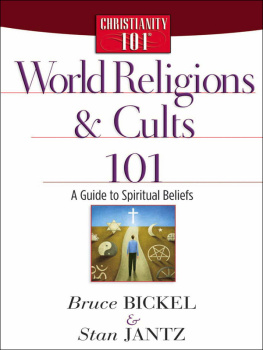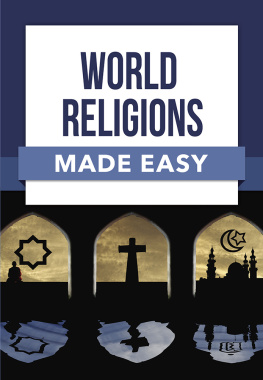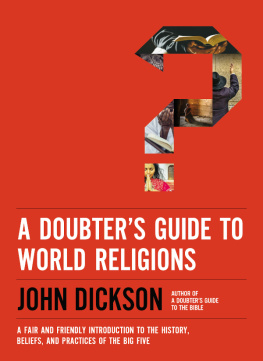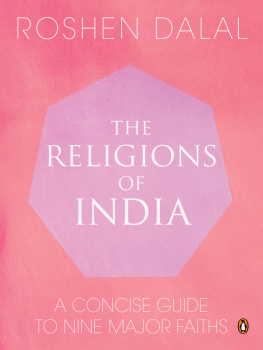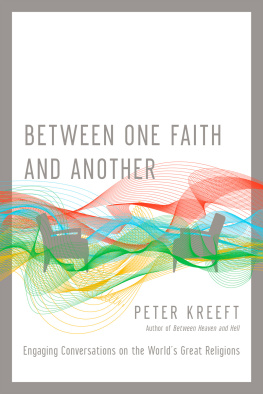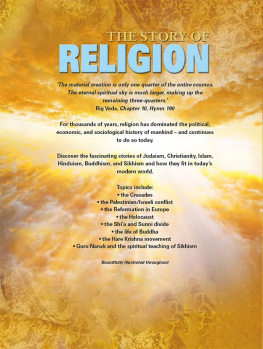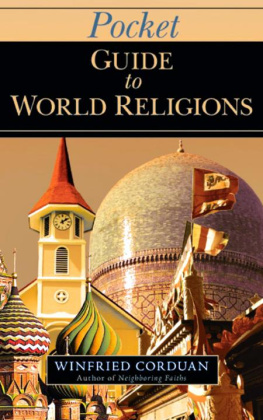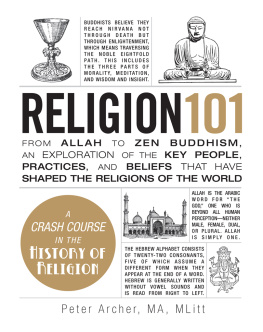
World Religions
An Indispensable
Introduction
Other Books by Gerald R. McDermott
Evangelicals and Mormons: Exploring the Boundaries (with Robert Millet)
The Great Theologians: A Brief Guide
The Oxford Handbook of Evangelical Theology
Gods Rivals: Why God Allows Different ReligionsInsights from the Bible and the Early Church
Jonathan Edwards Confronts the Gods: Christian Theology, Enlightenment Religion, and Non-Christian Faiths
Can Evangelicals Learn from Non-Christian Religions? Jesus, Revelation and the Religions
One Holy and Happy Society: The Public Theology of Jonathan Edwards
Understanding Jonathan Edwards: Introducing Americas Theologian
Seeing God: Jonathan Edwards and Spiritual Discernment
The Theology of Jonathan Edwards (with Michael McClymond)
Cancer: A Medical and Theological Guide for Patients and Their Families (with William A. Fintel, M.D.)
World Religions
An Indispensable
Introduction
Gerald R. McDermott

2011 by Gerald R. McDermott.
All rights reserved. No portion of this book may be reproduced, stored in a retrieval system, or transmitted in any form or by any meanselectronic, mechanical, photocopy, recording, scanning, or otherexcept for brief quotations in critical reviews or articles, without the prior written permission of the publisher.
Published in Nashville, Tennessee, by Thomas Nelson. Thomas Nelson is a registered trademark of Thomas Nelson, Inc.
Book design and composition by Upper Case Textual Services, Lawrence, Massachusetts.
Thomas Nelson, Inc., titles may be purchased in bulk for educational, business, fund-raising, or sales promotional use. For information, please e-mail SpecialMarkets@ThomasNelson.com.
Unless otherwise indicated, Scripture is taken from the NEW REVISED STANDARD VERSION of the Bible. 1989 by the Division of Christian Education of the National Council of the Churches of Christ in the U.S.A. All rights reserved.
Scripture marked NIV is taken from HOLY BIBLE: NEW INTERNATIONAL VERSION. 1973, 1978, 1984 by International Bible Society. Used by permission of Zondervan Publishing House. All rights reserved.
Scripture marked ESV is taken from the english standard version. 2001 by Crossway Bibles, a division of Good News Publishers.
The Library of Congress has cataloged the earlier edition as follows:
McDermott, Gerald R. (Gerald Robert)
The Baker pocket guide to world religions: what every Christian needs to know / Gerald R. McDermott.
p. cm.
Includes bibliographical references.
ISBN 978-0-8010-7160-7 (pbk.)
1. Religions. I. Title. II. Title: Pocket guide to world religions.
BL80.3.M33 2008
200dc22
2008002963
978-1-4185-4597-0 Paperback
Printed in the United States of America
This book is dedicated to my excellent friend and coauthor, one of the best oncologists in the world, Bill Fintel. He has helped me think about and write this and many other books.
Contents
I am deeply grateful to the following friends and colleagues for reading parts of the manuscript and giving expert advice: Alan Pieratt, Robert Benne, Mark Graham, Bill Fintel, Shang Quanyu, Brian Mahoney, Reginald Shareef, Karl Uotinen, Marwood Larson-Harris, and our good friends at the Northampton Seminar. My students in the fall 2007 iteration of Christian Theology and World Religions made helpful suggestions. I am appreciative of the adult VBS class at St. John Lutheran Church in Roanoke, whose members listened so well and helped me know what would and would not work for a broad audience. Byron Johnson and the Baylor Institute for Studies of Religion gave me the critical support I needed to carve out part of a summer for writing. Karen Harris helped me with some technical problems, as she has for other books, and she also gave a great suggestion. Thanks are also due to my student assistant Ella Wade for her help in preparing the final manuscript. Most important, my wife, Jean, as always, managed house and home and helped me think through things, so that I could write.

Introduction
Why Study the World Religions?
Or, Ignorance Is Not Bliss
Let me guessyoure a busy Christian. You know from the news, and your own neighbors, that the world religions are becoming more important every day. You also know that Christians are to share the good news of Jesus and that in todays pluralistic society this often means talking to folks who already have a religion, usually one of the major religions of the world. Not only that, but youre just plain interested in what others believe. The deeper you grow in your own faith, the more curious you become about the faith of others. Just what do they believe? And why do they do what they do? But you dont have time to read a big book on the world religions. Youre afraid you might not understand it anyway.
This book is for you. It is short and concise, and gives you an easy-to-understand overview of the most important beliefs (and some practices) of those who belong to the six most important non-Christian religions in the worldHinduism, Judaism, Buddhism, the Confucianism-Daoism combination of Chinese religion, Shinto, and Islam. It even has a chapter on Christianity so that you can understand and explain it better. Each chapter is self-contained, so if you dont have time right now to read the first few chapters but want to go right to Islam, for example, you can do so without losing anything important.
But first, lets get the lay of the landthe globe, that is. How many believers in the various religions are there? Here are some 2007 stats from two top experts on global religious statistics, David B. Barrett and Todd M. Johnson:
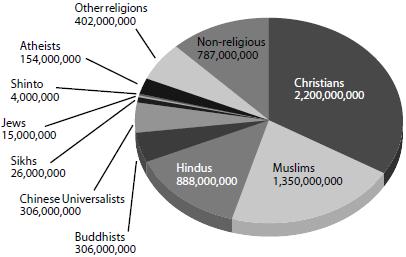
There are many more world religions, but these are the most recognizable and some of the most important. Notice these interesting facts:
1. Christians number exactly one-third of the world population.
2. Muslims are more than one-fifth.
3. That means that one-half of the world is either Muslim or Christian.
Another fact of interest is the relatively small combined number of atheists and nonreligious (the nonreligious are the folks who say, I am spiritual but dont believe in organized religion)941 million, or only 14 percent of the worlds population. Atheists are 2 percent. That percentage seems to decline as the years progress. This means that what many of us heard from our college professorsthat secularism is on the increasewas wrong. Peter Berger, distinguished sociologist at Boston University and one of the proponents of that secularization thesis, recently conceded, We were wrong. In other words, secularism is not on the risereligion is. Faith is gaining on nearly every continent (not Christian faith necessarily, but faith in one of the major religions), and that seems likely to be the case for decades to come.
The Value of Learning about Other Religions
Perhaps youre a bit wary of learning about other religions. (If not, you can skip this section.) You may have been told that learning about other faiths can diminish your own. Or perhaps you think that with your limited time, you should concentrate only on Scripture and Christian theology. Theres actually something to be said for spending a large chunk of your available study time on these. But consider the following reasons for learning at least some characteristics of other religions. You will gain understanding of your world, become more effective in your witness, understand your own faith better, become a better disciple, and work better with others.
Next page
